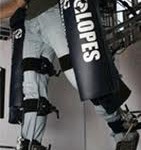Archive for Сентябрь 24th, 2011
Model predictive control-based gait pattern generation for wearable exoskeletons
- Тип контента: Научная статья
- Номер документа: 958
- Название документа: Model predictive control-based gait pattern generation for wearable exoskeletons
- Номер (DOI, IBSN, Патент): 10.1109/ICORR.2011.5975442
- Изобретатель/автор: van der Kooij, H., Van Asseldonk, E.H.F., Letian Wang
- Правопреемник/учебное заведение: Lab. of Biomech. Eng., Univ. of Twente, Enschede, Netherlands
- Дата публикации документа: 2011-08-12
- Страна опубликовавшая документ: Нидерланды (Голландия)
- Язык документа: Английский
- Наименование изделия: Не заполнено
- Источник: http://ieeexplore.ieee.org/search/freesrchabstract.jsp?tp=&a
- Вложения: Не заполнено
- Аналитик: Не заполнено
 This paper introduces a new method for controlling wearable exoskeletons that do not need predefined joint trajectories. Instead, it only needs basic gait descriptors such as step length, swing duration, and walking speed. End point Model Predictive Control (MPC) is used to generate the online joint trajectories based on these gait parameters. Real-time ability and control performance of the method during the swing phase of gait cycle is studied in this paper. Experiments are performed by helping a human subject swing his leg with different patterns in the LOPES gait trainer. Results show that the method is able to assist subjects to make steps with different step length and step duration without predefined joint trajectories and is fast enough for real-time implementation. Future study of the method will focus on controlling the exoskeletons in the entire gait cycle.
This paper introduces a new method for controlling wearable exoskeletons that do not need predefined joint trajectories. Instead, it only needs basic gait descriptors such as step length, swing duration, and walking speed. End point Model Predictive Control (MPC) is used to generate the online joint trajectories based on these gait parameters. Real-time ability and control performance of the method during the swing phase of gait cycle is studied in this paper. Experiments are performed by helping a human subject swing his leg with different patterns in the LOPES gait trainer. Results show that the method is able to assist subjects to make steps with different step length and step duration without predefined joint trajectories and is fast enough for real-time implementation. Future study of the method will focus on controlling the exoskeletons in the entire gait cycle.
Категория: Ищем научные статьи | Нет комментариев »
Estimating arm motion and force using EMG signals: On the control of exoskeletons
- Тип контента: Научная статья
- Номер документа: 956
- Название документа: Estimating arm motion and force using EMG signals: On the control of exoskeletons
- Номер (DOI, IBSN, Патент): 10.1109/IROS.2008.4650949
- Изобретатель/автор: Kyriakopoulos, K.J., Artemiadis, P.K.
- Правопреемник/учебное заведение: Sch. of Mech. Eng., Nat. Tech. Univ. of Athens, Athens
- Дата публикации документа: 2008-10-14
- Страна опубликовавшая документ: Греция
- Язык документа: Английский
- Наименование изделия: Не заполнено
- Источник: http://ieeexplore.ieee.org/search/freesrchabstract.jsp?tp=&a
- Вложения: Не заполнено
- Аналитик: Не заполнено
 There is a great effort during the last decades towards building robotic devices that are worn by humans. These devices, called exoskeletons, are used mainly for support and rehabilitation, as well as for augmentation of human capabilities. Providing a control interface for exoskeletons, that would guarantee comfort and safety, as well as efficiency and robustness, is still an issue. This paper presents a methodology for estimating human arm motion and force exerted, using electromyographic (EMG) signals from muscles of the upper limb. The proposed method is able to estimate motion of the human arm as well as force exerted from the upper limb to the environment, when the motion is constrained. Moreover, the method can distinguish the cases in which the motion is constrained or not (i.e. exertion of force versus free motion) which is of great importance for the control of exoskeletons. Furthermore, the method provides a continuous profile of estimated motion and force, in contrast to other methods used in the literature that can only detect initiation of movement or intention of force. The system is tested in an orthosis-like scenario, during planar movements, through various experiments. The experimental results prove the system efficiency, making the proposed methodology a strong candidate for an EMG-based control scheme applied in robotic exoskeletons.
There is a great effort during the last decades towards building robotic devices that are worn by humans. These devices, called exoskeletons, are used mainly for support and rehabilitation, as well as for augmentation of human capabilities. Providing a control interface for exoskeletons, that would guarantee comfort and safety, as well as efficiency and robustness, is still an issue. This paper presents a methodology for estimating human arm motion and force exerted, using electromyographic (EMG) signals from muscles of the upper limb. The proposed method is able to estimate motion of the human arm as well as force exerted from the upper limb to the environment, when the motion is constrained. Moreover, the method can distinguish the cases in which the motion is constrained or not (i.e. exertion of force versus free motion) which is of great importance for the control of exoskeletons. Furthermore, the method provides a continuous profile of estimated motion and force, in contrast to other methods used in the literature that can only detect initiation of movement or intention of force. The system is tested in an orthosis-like scenario, during planar movements, through various experiments. The experimental results prove the system efficiency, making the proposed methodology a strong candidate for an EMG-based control scheme applied in robotic exoskeletons.
Категория: Ищем научные статьи | Нет комментариев »
Anthropomorhic Exoskeleton dual arm/hand telerobot controller
- Тип контента: Научная статья
- Номер документа: 953
- Название документа: Anthropomorhic Exoskeleton dual arm/hand telerobot controller
- Номер (DOI, IBSN, Патент): 10.1109/IROS.1988.593687
- Изобретатель/автор: Jau, B.M.
- Правопреемник/учебное заведение: California Institute of Technology
- Дата публикации документа: 2002-08-06
- Страна опубликовавшая документ: США
- Язык документа: Английский
- Наименование изделия: Не заполнено
- Источник: http://ieeexplore.ieee.org/search/freesrchabstract.jsp?tp=&a
- Вложения: Не заполнено
- Аналитик: Не заполнено
Категория: Ищем научные статьи | Нет комментариев »
An explicit model to predict and interpret constraint force creation in pHRI with exoskeletons
- Тип контента: Научная статья
- Номер документа: 951
- Название документа: An explicit model to predict and interpret constraint force creation in pHRI with exoskeletons
- Номер (DOI, IBSN, Патент): 10.1109/ROBOT.2008.4543387
- Изобретатель/автор: Schiele, A.
- Правопреемник/учебное заведение: Mech. Eng. Dept., Eur. Space Agency, Noordwijk
- Дата публикации документа: 2008-06-13
- Страна опубликовавшая документ: Нидерланды (Голландия)
- Язык документа: Английский
- Наименование изделия: Не заполнено
- Источник: http://ieeexplore.ieee.org/search/freesrchabstract.jsp?tp=&a
- Вложения: Не заполнено
- Аналитик: Не заполнено
 It is the goal of this paper to introduce an analytical model that allows predicting and interpreting the characteristics of constraint forces generated by misaligned joint axes between human operators and wearable robots during physical human-robot interaction (pHRI). The pHRI model is based on geometric parameters that describe the combined human-robot system. It is applied in this paper to measured constraint forces from a pHRI experiment. The model is validated with the experimental data. The geometrical model parameters are identified from force and position measurements by non-linear parameter optimization. The attachment stiffness and the actual offsets between the exoskeleton and the human joints are estimated. For the tested subject, the stiffness reaches 222 N/m and constraint forces are shown to be in the order of plusmn 10 N. It is shown in this paper how an ergonomically designed wearable robot with passive compensation joints can reduce such interaction forces.
It is the goal of this paper to introduce an analytical model that allows predicting and interpreting the characteristics of constraint forces generated by misaligned joint axes between human operators and wearable robots during physical human-robot interaction (pHRI). The pHRI model is based on geometric parameters that describe the combined human-robot system. It is applied in this paper to measured constraint forces from a pHRI experiment. The model is validated with the experimental data. The geometrical model parameters are identified from force and position measurements by non-linear parameter optimization. The attachment stiffness and the actual offsets between the exoskeleton and the human joints are estimated. For the tested subject, the stiffness reaches 222 N/m and constraint forces are shown to be in the order of plusmn 10 N. It is shown in this paper how an ergonomically designed wearable robot with passive compensation joints can reduce such interaction forces.
Категория: Ищем научные статьи | Нет комментариев »
LOPES.Инженеры из Нидерландов готовятся делать полноценные экзоскелеты.
- Тип контента: Новостная статья
- Номер документа: 942
- Название документа: LOPES.Инженеры из Нидерландов готовятся делать полноценные экзоскелеты.
- Номер (DOI, IBSN, Патент): Не заполнено
- Изобретатель/автор: Не заполнено
- Правопреемник/учебное заведение: Не заполнено
- Дата публикации документа: Не заполнено
- Страна опубликовавшая документ: Россия
- Язык документа: Русский
- Наименование изделия: LOPES
- Источник: http://www.cybersecurity.ru/it/133304.html
- Вложения: Не заполнено
- Аналитик: Не заполнено
 Инженеры из Нидерландов разработали роботизированные протезы ног, при помощи которых пациенты с нарушениями в опорно-двигательной системе могут перемещаться и вновь отрабатывать навыки передвижений.
Инженеры из Нидерландов разработали роботизированные протезы ног, при помощи которых пациенты с нарушениями в опорно-двигательной системе могут перемещаться и вновь отрабатывать навыки передвижений.
Категория: LOPES | Нет комментариев »
Статистика
Категорий: 179
Статей всего: 2,003
По типу:
Видео: 36
Выдержка с форума: 1
Контактные данные: 12
Научная статья: 1388
Не заполнено: 5
Новостная статья: 317
Обзор технологии: 42
Патент: 219
Тех.подробности: 34
Тип: 1
Комментариев: 8,709
Изображений: 3,005
Подробней...
ТОР 10 аналитиков
-
Глаголева Елена - 591
Дмитрий Соловьев - 459
Helix - 218
Ридна Украина))) - 85
Наталья Черкасова - 81
max-orduan - 29
Елена Токай - 15
Роман Михайлов - 9
Мансур Жигануров - 4
Дуванова Татьяна - 3
Календарь
Авторизация
Ошибка в тексте?
Выдели её мышкой!
И нажми Ctrl+Enter

